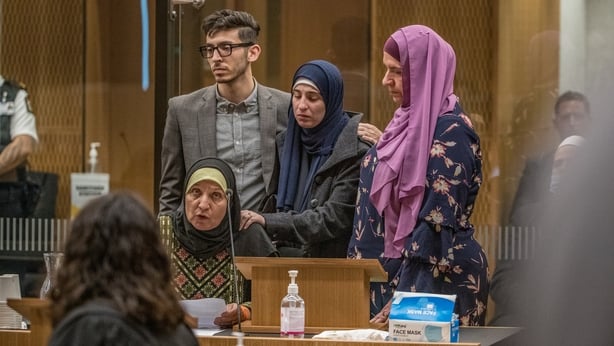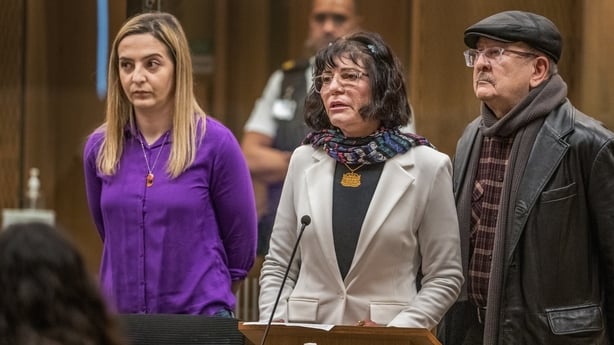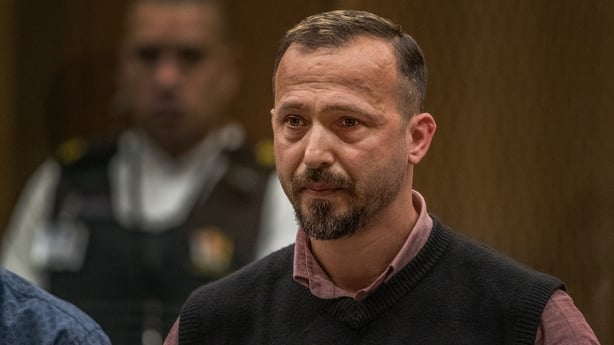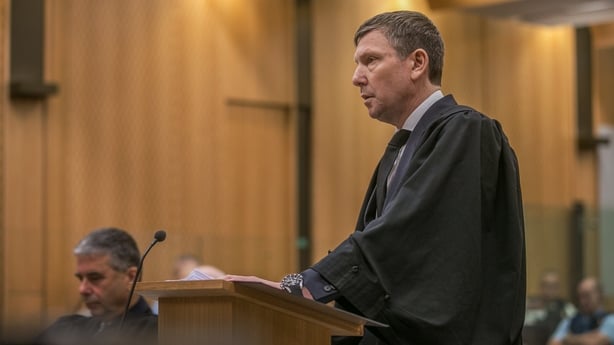The sentencing hearing for the man who carried out the Christchurch mosque shooting opened with testimony from members of the Muslim community that the white supremacist targeted on 15 March last year.
Despite the horror they experienced at the two mosques, witnesses confronted the gunman, who sat impassively in the dock.
Brenton Tarrant, 29, has pleaded guilty to 51 murder charges, 40 charges of attempted murder and one charge of committing a terrorist act in relation to the massacre in the city of Christchurch, which he live streamed on Facebook.

"You transgress beyond comprehension, I cannot forgive you," said Maysoon Salama, whose son Atta Elayyan was killed.
"You gave yourself the authority to take the souls of 51 innocent people, their only crime - in your eyes - being Muslims."
Ms Salama said the 29-year-old had not achieved his self-appointed mission to undermine New Zealand's small, tight-knit Muslim community.
"You thought you could break us, you failed miserably," she said.
"We became more determined to hold tight to Islam and our beloved ones are martyrs."

'Your hatred is unnecessary'
Khaled Alnobani echoed the sentiment, pointing to Tarrant and declaring: "We have become more united. Thank you for that."
Gamal Fouda, the Al Noor mosque's imam, said he would not allow Tarrant's actions to sully a place of peace and love for his people.
"I was standing on the pulpit and saw the hate in the eyes of a brainwashed terrorist, I lived with that nightmare afterwards," he said, telling Tarrant: "Your hatred is unnecessary."

Janna Ezat, whose son Hussein Al-umari was killed as he tried to rush the shooter, said she made a decision not to hate Tarrant.
"I decided to forgive you Mr Tarrant because I don't have hate ... If we are able to forgive, we forgive," she said.
"The damage was done and Hussein will never be here but I have only one choice and that is to forgive you."
Temel Atacocugu, originally from Turkey, said he drew hope from the outpouring of support the wider New Zealand community showed for their Muslim compatriots after the atrocity.

"I came to New Zealand to live with my family because it's a peaceful country and, despite the events of March 15, I believe it will stay that way," said Mr Atacocugu, who played dead after being shot nine times at the Al Noor mosque.
'I will never forget'
Mariam Gul, whose parents and sister were murdered, said Tarrant needed to educate himself and acknowledge that Islam was a religion of peace.
"This realisation can come if he independently studies Islam," she said.
The court heard of evidence of children shot in cold blood and the wounded callously gunned down while calling for help as Tarrant ran amok in the mosques, creating what some described as a war zone.
Some survivors talked about suffering permanent disability and mental anguish that remained fresh more than a year after the atrocity.
"I see the images and I hear the constant sound rata-rata-rata - the sound of the gun shooting in my head," said Abdiaziz Ali Jama, a 44-year-old Somali refugee.
"I see a lot of dead people. I have been frightened, I talk constantly at night. I hear noise and go outside sometimes to look for the shooter. I will never forget what I saw that day."
Tarrant planned attack for years
A prosecutor told a court at the start of sentencing hearings that Tarrant spent years meticulously planning his shooting rampage.
The gunman spent years purchasing high-powered firearms, researched mosque layouts by flying a drone over his primary target, and timed his 15 March attacks to maximise casualties, the prosecutor said.
Barnaby Hawes said Tarrant told police after his arrest that he wanted to create fear among the Muslim population.

He went to Christchurch about two months before the attack and flew a drone directly over the Al Noor mosque, with a focus on its entry and exit points.
"He intended to instil fear into those he described as invaders, including the Muslim population or more generally non-European immigrants," Mr Hawes said.
Tarrant also expressed regret for not taking more lives and had planned to burn the mosques down, Mr Hawes said.
Handcuffed and dressed in grey prison clothes, Tarrant, who faces a life in prison possibly without parole, sat with hands clasped for most of the morning's proceedings.
He showed little emotion and looked directly at those delivering victim impact statements.
While most of Tarrant's victims were at Al Noor mosque, he attacked a second mosque before being detained en route to a third.
The attacks prompted a global outpouring of grief as well as scrutiny, with regulations imposed on online platforms after the then 28-year-old live-streamed the mosque shootings shortly after uploading a manifesto.

Security was tight outside the court, with police dogs pacing the streets and snipers on rooftops, television footage showed.
With social distancing measures in place due to the re-emergence of coronavirus in New Zealand, a small public gallery was at the main court, with survivors and families of victims viewing the proceedings in seven overflow court rooms.
Live reporting from the courtroom is banned and other restrictions have been put in place on what the media can report.
High Court judge Cameron Mander said that he had received more than 200 victim impact statements, along with submissions from various organisations.
"I have read them all," said Judge Mander, who added that he would not sentence Tarrant before Thursday morning after survivors and family members of victims had an opportunity to address the court.
A murder conviction carries a mandatory sentence of life in prison. The judge can impose a life term without parole, a sentence that has never been used in New Zealand.

